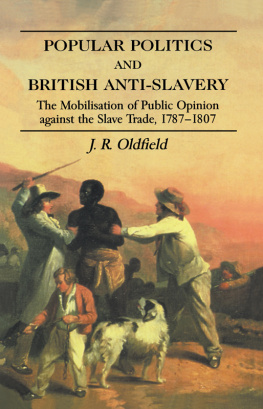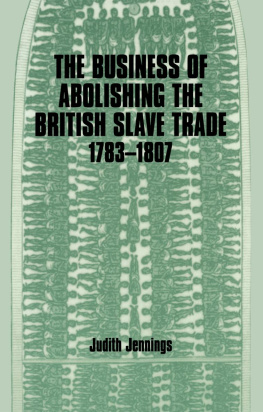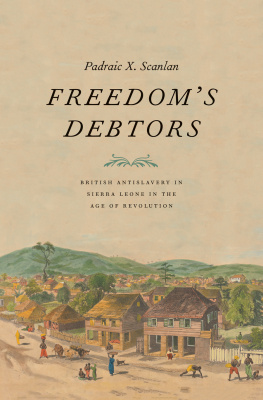First published in 1995 by Manchester University Press, Manchester This edition published in 1998 in Great Britain by
Routledge
2 Park Square, Milton Park, Abingdon, Oxon, OX14 4RN
270 Madison Ave, New York NY 10016
Transferred to Digital Printing 2008
Copyright 1998 Routledge Publishers
Website: http://www.routledge.com
British Library Cataloguing in Publication Data Oldfield, J.R.
Popular politics and British anti-slavery: the mobilisation of public opinion against the slave trade, 17871807. 2nd ed. (Studies in slave and post-slave societies and cultures; v. 6)
I . SlaveryGreat BritainPublic opinion 2. Antislavery movementsGreat BritainPublic opinion
I. Title
326.0941
ISBN 0714644625 (paper)
ISSN 14621770
Library of Congress Cataloging-in-Publication Data
Oldfield, J.R. (John R.)
Popular politics and British anti-slavery: the mobilisation of public opinion against the slave trade, 17871807/J.R. Oldfield.
p. cm. (Studies in slave and post-slave societies and cultures, ISSN 14621770)
Includes bibliographical references and index.
ISBN 0714644625
I . Antislavery movementsGreat Britain. 2. Slave-trade Great BritainPublic opinion. 3. Public opinionGreat Britain.
I. Title. II. Series.
HT II62.057 1998
326.8094209033dc21 9829907
CIP
All rights reserved. No part of this publication may be reproduced, stored or introduced into a retrieval system or transmitted, in any form or by any means, electronic, mechanical, photocopying, recording, or otherwise, without the prior permission of the publisher of this book.
Publisher's Note
The publisher has gone to great lengths to ensure the quality of this reprint but points out that some imperfections in the original may be apparent
Foreword
The Atlantic slave trade was a critical element in the transformation of the Americas and in the dislocation of wide areas of African life. In its early Iberian days it seemed a marginal issue. But the establishment of the sugar industry, first in Brazil, then in the British West Indies, and the development of the tobacco plantations of the Chesapeake, quickly established the economic importance of African labour. A critical formula emerged, of American lands, European investment and technology and African labour. There followed that transformation of the Atlantic world into a familiar mould; vast numbers of enslaved Africans toiling for the material betterment of white settlers and their European backers, with a consequential improvement in the material advancement of western Europe. It is hard to recall, today, that until the 1820s it was the African, not the European, who was the typical migrant to key areas of the Americas. But, of course the Africans were not migrants in the conventional sense. They were victims of a rapacious trading and colonising system which reached from Europe, to Africa and thence to the Americas.
Early proponents of overseas settlement and trade had long argued that major economic benefits would accrue to the Mother Country. And by the 1680s few could doubt that they were correct. Yet much of the material well-being which came the way of the colonising British came from slave labour. Moreover, the slave contribution to British life could be seen in everyday British domestic settings; in the vast amounts of sugar consumed with tea and coffee, and used as an ingredient in an array of popular dishes, and in the smoking habits of men across the length and breadth of Britain. There were also the human reminders, notably that handful of blacks who settled in Britain (normally against their will) and who often found work as domestics to propertied employers.
Despite these local reminders of the slave impact on British life, the slaves were, in general, out of sight and out of mind; labouring helots on the far side of the Atlantic whose conditions scarcely ruffled the conscience of the people who benefited most from their efforts British consumers. It is true of course that the British did not invent or devise the Atlantic slave trade or the plantation system. But it was the British who shipped more Africans than any other nation in the course of the eighteenth century and whose shippers and merchants honed and finely tuned the Atlantic system as no others before. It was the British whose domestic life was so thoroughly permeated by the consequences of slave labour, from the simple fact of domestic sugar consumption, to the economic benefits which flowed to London, Bristol, Liverpool (and the hinterlands which serviced those and other slaving ports). The Atlantic slave system was too prospering a form of trade and commerce to criticise or diminish. Yet, by the 1780s at a time when the system was as prosperous as ever a small band of critics met to consider how best to civilise slavery, and ultimately to bring it to its knees.
Historians continue to puzzle about the process of abolition. Why, if the slave system remained buoyant and profitable, did the British turn against it? Why turn against the slave trade in the last two decades of the eighteenth century, and not before? There have of course been a number of explanations, beginning with the justifications of the abolitionists themselves. They led by Thomas Clarkson and by the descendants of Wilberforce were in a unique position to provide insiders answers. Indeed the historiography of British abolition has been haunted by the abolitionists or by the more prominent abolitionists. In recent years, however, scholars have shifted their attention, away from the high polities of formal, parliamentary abolition, to the more popular aspects of the abolition campaign. To view the campaign against the slave trade (and later against slavery) as a parliamentary affair is to see only one aspect of a highly complex process. Though parliamentary history (tactics, party politics, personal biographies) remains important (Abolition and Emancipation were, after all, Acts of Parliament), recent scholars have sought to explore the roots of abolition.
The importance of J.R. Oldfields book, now appearing in paperback for the first time, is that he advances the broadly based study of popular abolition further than any previous scholar. Building on the work of earlier scholars, notably Seymour Drescher, Oldfields research serves to clinch a simple but critical issue, namely that in the attack on the slave trade, popular revulsion was crucial. What follows is the teasing out of that basic point; that in generating hostility to the continuation of the British involvement in the Atlantic slave trade, the abolition movement after 1787 laid special stress on rallying popular feeling.
It is of course a great curiosity. The nation which had perfected Atlantic slaving, which benefited most from its material and commercial rewards, very quickly turned its back against it. Nor was this merely a question of formal propertied politics. The importance of Oldfields carefully researched argument is to illustrate and prove the emergence and extent of popular abolition. It was, in many respects, the first modern successful campaign of popular politics. Others were to follow with varying success (the Corresponding Societies, Chartism, Free Trade), but abolition now stands out as the pioneer. In explaining the details of popular abolition its political and intellectual roots, its geographical location, its intersection with the world of popular print and graphic illustration, Oldfield places the campaign at the centre of late-eighteenth century social and political life. As such, the broader campaign to end the Atlantic slave is more easily understood. This study is an important contribution to out awareness not simply of abolition, but of the changing nature of popular politics in the last years of the eighteenth century.






